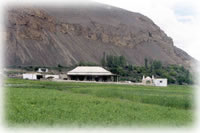 |
 |
||
 |
|||
|
RELATED THEMES culture and customs festivals identity social institutions OTHER LOCAL THEMES BACKGROUND |
spiritual beliefs
Although there is limited discussion of personal beliefs and the spiritual side of religion, the importance of Ismailism and the current Imam, the Aga Khan, in people's lives is strongly evident throughout the testimonies. There are many references to the Aga Khan and Ismailism, mostly in relation to his guidance on education, as well as the various Ismaili village institutions and the various Aga Khan development projects operating in the Northern Areas. Important aspects of Ismailism are education and serving the community and these are often referred to by the narrators. Gulshad explains people's motivation to work on a voluntary basis for the community: "…there exist a number of institutions in the village. These institutions are the women and men volunteers, boy scouts and girl guides etc. These institutions extend all possible help to the orphans, widows, poor and needy people of the society… They voluntarily work for the people just to get the blessing of Maula (literally master, refers to the Aga Khan). In such services no one is obliged or no one needs to be thanked for the services. Its reward is only the blessings of Maula, and it is that very blessing that [is the reason] people prefer to give their services for free, rather than do their own commitments" (Pakistan 17). Ismaili institutions are the basis of much of Shimshal's development, education, leisure and political decisionmaking. Only one narrator (Pakistan 11) criticises the influence of what he regards as urban-based Ismaili institutions on culture and tradition in Shimshal. There is little reference to non-Islamic beliefs; one narrator mentions fairies and one refers to a previous shaman in the community. There are however several references to Shams (a saint). One narrator explains: "I have a strong belief in Shams. Whenever there had been dispute or disagreement in the village and people have inclined to Shams he always rewarded them with compassion" (Pakistan 5). quotes about spiritual beliefs"Our ancestors had various predictions about this era. They termed this era as the Qamari Daur (the era of the moon). It is a Persian word. According to the prediction by a saint… a time will come when people will land on the moon and will tour it. That will be Aakhir Zaman (the last era). That will be the end of the universe… Our ancestors were scared of this era…the era of prosperity and liberty… One of the symbols of Aakhir Daur will be the lack of love and affection for one another. There will be much freedom and nobody will care for others… That era that our ancestors were afraid of has come about. So we are required to recite [the name of Allah/God] and should recite and start everything with the name of God and promote honesty. Only then will we remain successful in Qamari Daur and not go astray, otherwise we will be at a loss. I am just telling you about the predictions of the saint." "As far as I am concerned I have never seen any ghost or spirit throughout my life. Although our house was at a remote corner of the village - and I used to go early in the morning and at night for prayer in Jamat khana that was situated on the other corner of village - I was not afraid of anything, though I often heard others talking about ghosts and spirits." "I undertook this job in the light of the farman (instruction/guidance) of our Imam (the Aga Khan). Our Imam says that volunteers are a very important part of our institutions. So it has been my immense motives to prefer volunteer works to my personal interests for the pleasure of my Imam and to follow the instructions of the senior women rendering volunteer services to the community and to get their blessings." "I cannot describe the facilities we possess today in comparison with the olden times, but our gratitude for God has decreased. We do not offer our thanks to God for what he bestowed upon us. God has granted us every comfort of life but in my view we do not offer our gratitude in return." |
|
 Shimshalis, like most other communities in Hunza and Gojal, belong to the Ismaili sect of Islam: a moderate branch of the Shia tradition. Ismailis differed from most Shias over the seventh Imam (spiritual leader) and instead recognised the elder son of the sixth Imam. Whilst Shias believe their last Imam (the 12th), who disappeared in AD 878, is still alive and will re-appear, Ismailis recognise the Aga Khan as their living spiritual leader. According to Ismailis, their Imam's role is to guide people according to the times, and several narrators acknowledge this valuable role:
Shimshalis, like most other communities in Hunza and Gojal, belong to the Ismaili sect of Islam: a moderate branch of the Shia tradition. Ismailis differed from most Shias over the seventh Imam (spiritual leader) and instead recognised the elder son of the sixth Imam. Whilst Shias believe their last Imam (the 12th), who disappeared in AD 878, is still alive and will re-appear, Ismailis recognise the Aga Khan as their living spiritual leader. According to Ismailis, their Imam's role is to guide people according to the times, and several narrators acknowledge this valuable role: